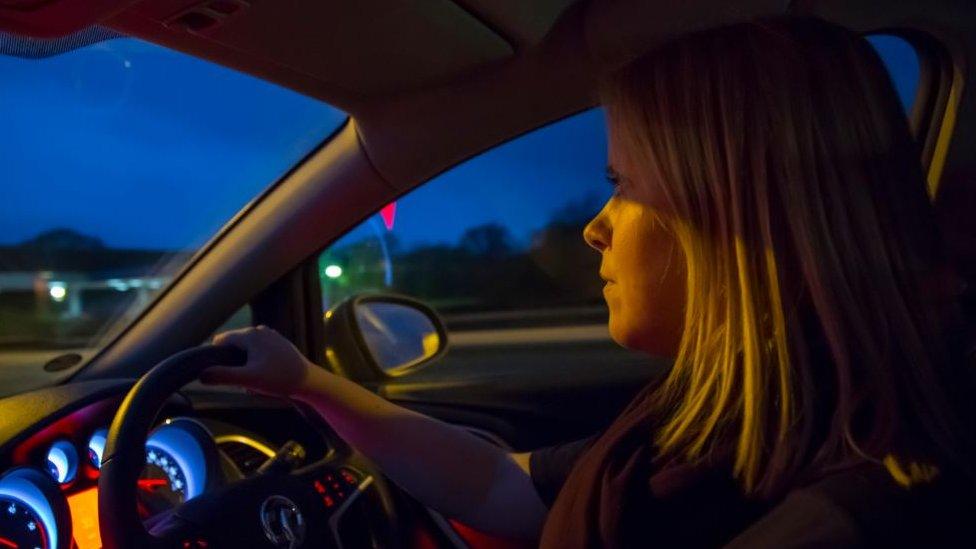How do you drive safely in the dark?
- Published
Young people said they needed to be able to drive at night
One in five new motorists are involved in an accident during their first year behind the wheel, figures suggest.
In an effort to address this, the government has announced it is considering a ban on new drivers in England, Scotland and Wales travelling at night.
The Royal Society for the Prevention of Accidents (RoSPA) says there is a spike in the number of road users killed or injured, external when the clocks go back.
So what can you do to ensure you are driving safely in the dark?
1. Watch your lights
It's illegal in the UK to drive at night without properly functioning lights.
Driving instructor Karen Jones, who is based in Shrewsbury, advises all drivers to ensure their cars are in full working order.
She says: "Everyone should be able to make those basic checks, not just on their lights but everything else too."

Driving instructor Karen Jones believes the government should ensure new drivers complete a compulsory amount of lessons before they take their test
Rod Dennis, from the RAC, adds: "Turn dipped headlights on about an hour before sunset and keep them on an hour after sunrise to ensure you are clearly visible to other road users. If you see another vehicle switch back to dipped beam straight away so you don't dazzle them."
2. Don't get distracted by other cars
Turn your gaze away from other lights on the road and don't look at oncoming high beams to avoid being dazzled.
If you are struggling to see because of another vehicle's lights, look to the left-hand side of the road and follow the white line marking the edge (if there is one) in order to keep track of your position.
If the glare is so bad that you can't see anything, slow down but avoid stopping completely - this could cause a car travelling behind you to run into the back of you.
"Learners tend to stare at oncoming vehicles - that's the passenger in them coming out. It's our job to get them out of that mindset from being a passenger into a driver," says Karen Jones.
3. Make sure your windscreen is clean
Condensation or dirt on the inside or outside of your windows can seriously impair visibility, so make sure they are clean and clear before driving your car.
Rod Dennis says: "Windscreens are particularly susceptible to steaming up on the inside, especially in cold weather, while car heaters can blow dirty air at the glass, causing a hazy film to build up on the inside.
"This can in turn increase glare from oncoming headlamps."
4. Keep your speed down
Karen Jones believes that new drivers in particular should keep an eye on their speed when travelling at night.
She says: "Drivers now are having to deal with more hazards than ever before, while behind the wheel of more powerful cars."

Jane Taylor, head of training at RED Driving School, says: "Watching out for hazards requires particular focus at night. Drivers should be aware of exuberant passengers who can easily distract the driver, while passengers should be aware of their responsibility to avoid dangerous behaviour.
"A key skill to hone is speed. So, as visibility deteriorates at night, drivers must reduce their speed down to give them extra time to respond."
5. Practise driving at night
The government's Pass Plus driving course offers a night driving module which deals with the correct use of headlamps, getting used to being dazzled and judging speeds and distance.
Rod Dennis says: "If you are learning to drive, talk to your instructor and insist on getting some experience at night - and if you've recently passed, consider some extra lessons to brush up, or think about taking a Pass Plus course which includes modules on night-time driving."
Karen Jones adds: "I did a Pass Plus last week to improve the girl's skills - she is an anxious driver and it helped her. Pass Plus is not compulsory but at the end of the day, prevention is better than cure."